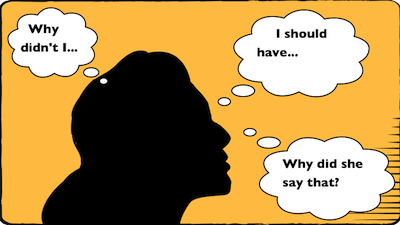Module 2: Job Stress
Self-Talk
Dr. Chamberlin and Doug Modig leave us with the message that our brains are plastic, it’s never too late to retrain our brain. One way we can do this is by observing and changing our self-talk. Researchers have shown that what we tell ourselves can affect our feelings, perceptions, and behavior 2,3.

What is self-talk?
Self-talk is your inner voice that says things you usually don’t say out loud. It's the way you "talk" to yourself. Self-talk can be positive or negative, and both can have a great impact on your feelings, actions, and self-confidence.
Positive self-talk
Can make you feel good about yourself and what’s going on in your life. It’s like having a coach or an optimistic voice in your head that is encouraging and looks on the bright side.
Examples – “This is hard, but I can try!” "I'm smart enough to figure this out!"
Negative self-talk
Can make you feel bad about yourself and life. The messages are self-defeating, blaming and often create a “snowball effect” that can overwhelm our minds.
Examples – “I can’t, I am not good enough, I’m stupid.” “Everything is going wrong, nothing is going to get better”